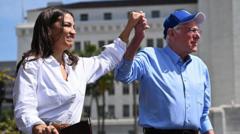In a rally in Bakersfield, California, Senator Bernie Sanders and Congresswoman Alexandria Ocasio-Cortez were met with enthusiastic support from local Democrats, expressing dissatisfaction with their party's leadership amidst President Trump’s administration. The Democratic Party is at a crossroads, facing demands for a more unified opposition while grappling with ideological divides and generational shifts in leadership.
A Deep Divide: Democrats Face Internal Struggles Amidst Calls for Action

A Deep Divide: Democrats Face Internal Struggles Amidst Calls for Action
Amidst internal conflicts and rising frustrations, Democrats seek direction in a landscape dominated by contrasting ideologies and discontent with leadership.
In the rural heart of Bakersfield, California, a community not typically associated with progressive politics, Democratic Congresswoman Alexandria Ocasio-Cortez and Independent Senator Bernie Sanders have sparked dialogue and debate. The pair drew a crowd on their "Fighting Oligarchy" tour, despite the region's strong support for President Trump in the last election. Attendees of the rally echoed sentiments of frustration, voicing their concerns about the Democratic Party's failure to present a cohesive counter to the administration's policies.
This rally comes at a tense time for many Democrats, who find themselves without a clear path forward. Various factions within the party are clashing, complicating efforts to rally around a unified message. A CNN/SSRS poll suggests that over half of Democrat-leaning voters believe their party's leadership is steering in the wrong direction, with an overwhelming desire for stronger opposition to Republican initiatives. There is a growing sentiment urging leaders to take decisive action instead of merely existing within the political landscape.
As demonstrated by the rally at Bakersfield, the need for a potent opposition resonates deeply among constituents. For many attendees, like Juan Dominguez, the current output from Congress feels insufficient, advocating for park Democrats to at least attempt to slow down Republican agendas. Former Pennsylvania congressman Conor Lamb captured the urgency from within the party's base, emphasizing a need to act with a sense of immediacy regarding the system's integrity.
Sanders and Ocasio-Cortez's approach offers a focused strategy targeting economic grievances, particularly following the challenges that arose during Trump's presidency. Their message resonates locally as Olcart and medium have historically differed from the urban strongholds. “Oligarchy or democracy?” was how Ocasio-Cortez framed the conversation, connecting with burgeoning concerns over economic disparities exacerbated by billionaires such as Elon Musk.
Despite activism from figureheads like Sanders and Ocasio-Cortez, internal debates over the party's strategy have intensified. Some Democrats express discontent with perceived liberal overreach on social issues, arguing that the party must widen its base to regain foothold in American politics. California Governor Gavin Newsom is positioning himself as a centrist voice amid turmoil, conducting discussions with both liberal and conservative figures to encourage civil discourse, a move that has sparked contention within his party.
Moreover, younger leaders like David Hogg have publicly challenged established Democrats, waving flags for a new direction. Hogg's commitment to funding political challengers in primary elections displays a desire for robust progressivism that contrasts sharply with older strategists like James Carville, who advocate for traditional electoral approaches.
For Democrats navigating a challenging political landscape, the message from Bakersfield attendees remains clear—action must transcend talk. With incited energies from within and calls for vocal opposition rising, the expectation is set for Democratic leaders to seize the moment, showing constituents that they not only hear their demands, but are also willing to act decisively.




















